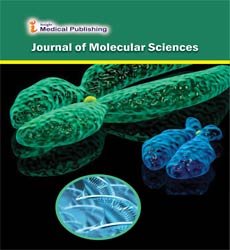Thrombospondin-4: A Master Regulator of Angiogenesis
Santoshi Muppala*
Department of Molecular Cardiology, Institute Cleveland Clinic Foundation, Cleveland, USA
- *Corresponding Author:
- Santoshi Muppala
Scientist, Department of Molecular Cardiology
Lerner Research, Institute Cleveland Clinic Foundation, Cleveland, USA
Tel: +1 530-302-7466
E-mail: santoshi92028@gmail.com
Received Date: December 03, 2018; Accepted Date: December 10, 2018; Published Date: January 18, 2019
Citation: Muppala S (2018) Thrombospondin-4: A Master Regulator of Angiogenesis. J Mol Sci. 3:1.
Editorial
For years, cancer research has been heavily focused on specific cell types. Only recently it became increasingly appreciated that the extracellular matrix (ECM) plays an enormously important role in determining the fate of cancers. ECM plays an important role in the regulation of angiogenesis. Abnormal angiogenesis is a causative or a contributory factor in the development of many cancers.
Angiogenesis, the development of new blood vessels, is an essential and complex response involving interplay between multiple cell types, growth factors and the extracellular matrix (ECM). Transforming Growth Factor beta1 (TGF-β1), a proinflammatory cytokine, has many important functions, including regulation of cell proliferation, inflammation, development of atherosclerotic lesions, angiogenesis and progression of many cancers.
Thrombospondins are the extracellular matrix proteins. There are divided into 2 subgroups based on their structure. They are highly homologous proteins. They have existing functions in cell-matrix interactions, tissue remodeling, endothelial cell adhesion, migration, angiogenesis and tumor growth. Thrombospondin-4 (TSP-4) is a member of thrombospondin protein family of secreted matricellular proteins (ECM proteins regulating the interactions between cells and matrix). We reported for the first time, in endothelial cells (EC), TGF-β dramatically increases the expression of TSP-4, and further TSP-4 mediates TGF-β induced angiogenesis. Exploring the underlying molecular mechanisms of pro-angiogenic TSP-4 will halt angiogenesis and reduces the risk of progression of cancers which can become a therapeutically important target addressing mainly angiogenesis.
Deregulated angiogenesis, Inflammation and oxidative damage determine the maturity of the tumor vasculature and microenvironment. One of the important events occurring during the tumor progression is Extracellular matrix (ECM) stiffening with more deposition of collagen and fibronectin leads to increased proliferation which corresponds to the tumor advancement. Cancer associated fibroblasts are the important contributors of ECM stiffening. ECM plays a key role in the development of tumor vasculature. On the other hand, angiogenesis is also one of the crucial events that lead to increased tumor vasculature and metastasis. Dysfunctional tumor vasculature expedites tumor progression. Therefore, enhanced angiogenesis and degradation of ECM are the major crucial characteristics of the tumor vasculature. Targeting angiogenesis regulated proteins will be an alternative beneficial strategy to treat many cancers.
Another important contributor is tumor microenvironment being expressed by many number of oncogenes which drives the tumorigenesis will be the current potential therapeutic target. Tumor microenvironment is composed of many components like tumor cells, deregulated ECM, fibroblasts, endothelial cells, macrophages, inflammatory cytokines and immune cells. Tumor microenvironment will promote migration and proliferation of tumor associated fibroblasts and enhances the inflammation and angiogenesis to strengthen the tumor growth. Cancer progression is mainly dependent on the interplay between the tumor cells and the tumor microenvironment.
Existing evidence from our group and others suggest that thrombospondin-4 (TSP-4) is a novel pro- angiogenic protein and TSP-4 is upregulated in endothelial cells by TGF-beta1. It stimulates tumor growth and angiogenesis induced by TGFbeta1. TSP-4 is one of the top 1% of highly upregulated genes in the progression of breast and gastric cancers. Loss of miR-142 results in high expression of TSP-4 thereby enhancing hepatocellular carcinoma invasion and progression. Therefore, targeting TSP-4 is an important strategy to treat HCC. Increased expression of TSP-4 in extracellular matrix promotes invasion of breast cancer cells. Another interesting study stated that TSP-4 mRNA expression in fibroblasts was stimulated by cancer cells, suggesting an important marker in the detection of diffuse-type gastric adenocarcinomas. On the other hand, TSP-4 serves as a tumor suppressor in colorectal cancer by suppressing in vitro tumor colony formation. Epigenetic profiling studies revealed that hypermethylation of TSP-4 promoter leads to the inactivation of its function as a tumor suppressor gene in Cutaneous T Cell Lymphoma (CTCL). All the above important studies highlight the importance of TSP-4 in the regulation of cancer and further understanding the molecular mechanisms can represent TSP-4 as an important therapeutic target against cancer.
Open Access Journals
- Aquaculture & Veterinary Science
- Chemistry & Chemical Sciences
- Clinical Sciences
- Engineering
- General Science
- Genetics & Molecular Biology
- Health Care & Nursing
- Immunology & Microbiology
- Materials Science
- Mathematics & Physics
- Medical Sciences
- Neurology & Psychiatry
- Oncology & Cancer Science
- Pharmaceutical Sciences
